Will Covid Drive Companies To Relocate To All-Inclusive Tropical Locations? This Man Is Betting Yes.
The COVID-19 pandemic has forced countless companies to close their offices worldwide, either following local mandates or out of a desire to protect their own employees. Major cosmopolitan centers, such as New York City, have become ghost towns as corporations and employees fled. Some, such as famed author and influencer James Altucher, believe they will never return. Where will they go and could ecovillages provide a safe haven for them?
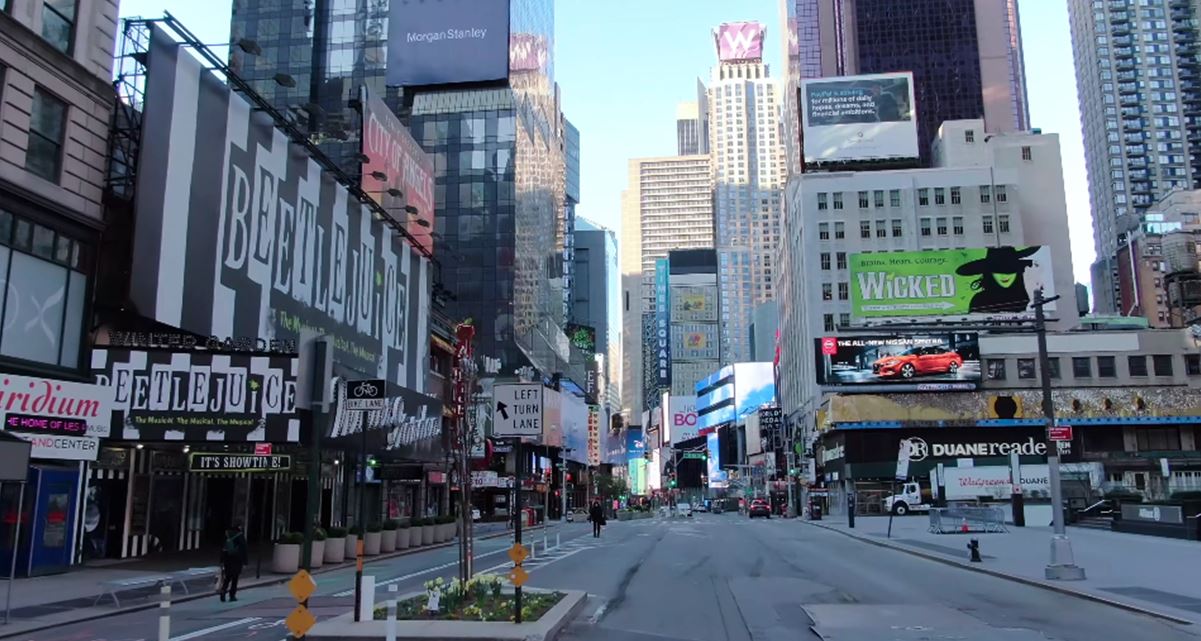
Pandemic Stricken Midtown Manhattan (Image source)
Ecovillages are nothing new. Some of today’s most well-known villages evolved from experimental towns with a rich history. The oldest of which is Solheimar, founded in Iceland in 1930. But the first ecovillage as we know it today was conceived by environmentalist Joan Bokaer back in 1990. Her vision eventually came to fruition when the first residents moved into the village six years later with the goal of creating “positive solutions to the social, environmental and economic crises facing the planet.” The community, now known as The EcoVillage at Ithaca, was the first, but far from the last of its kind. It launched a movement that now spans the globe. In fact, according to the Global Ecovillage Network, there are currently almost 500 communities that self-identify as an eco-village.
So what exactly is an eco-village? The official definition, penned by The Global Ecovillage Network defines one as:
“An intentional or traditional community using local participatory processes to holistically integrate ecological, economic, social, and cultural dimensions of sustainability in order to regenerate social and natural environments.”
Which can be quite a mouthful, but in short, it’s simply any community which chooses to live in a positive way while having a minimal impact on the environment.
So why, after so many years of being largely ignored by the mainstream media, is the concept suddenly making headlines in 2020? The answer comes down to one word: COVID-19. The global pandemic has upended the world as we know it. Individuals, companies and entire cities are learning how to adapt and in some cases, completely reinvent themselves. Could ecovillages provide the solution so many are seeking?
To help us in our search for the answer, we had the opportunity to interview Liran Rosenfeld, the founder of Yoko Village, one of the newest ecovillages. Yoko Village is unique in that it is focused on residents’ leisure life and work life, offering a healthy balance. It’s an all-inclusive community that offers everything a company would need to operate from a remote location, far away from the dangers of COVID-19. At the same time, it boasts all the amenities that individuals and families would need to live engaging and fulfilling lives - from community and sports centers to gourmet dining facilities, schools, and more.
We have all witnessed first-hand the negative impact that lockdowns have had on the social and emotional well-being of individuals, especially children. Even as some places such as the US try to ease restrictions, many are still afraid to leave their homes, even to work. At the same time, many of us including myself, have experienced the challenges of working remotely. Even with all the technological advancements we have today for remote work such as email, video conferencing and the like, they cannot replace the productive benefits of being able to work face-to-face with fellow team members. Not to mention the additional challenges of trying to work surrounded by all the distractions that permeate our home (and while we mostly blame our kids, the lure of Facebook and Netflix can be equally to blame). So we spoke to Liran to better understand if communities like Yoko Village are the answer to the problems we all face in 2020, and the uncertainty that lies beyond...
To truly understand Yoko Village and why it’s so relevant to the current situation, one must first understand the journey that led Liran to its creation. His story is actually quite similar to that of many entrepreneurs. After failing to secure an additional round of funding for his previous venture, he found himself working to the point of exhaustion and burnout.
“The stress of working 16 hour days for five years left me sick, depressed, and losing my hair. I stopped liking myself when I looked in the mirror. In an attempt to heal myself, I traveled to Costa Rica for a vacation in 2018 and my life was forever changed.”
While surrounded by the beauty of Costa Rica, Liran was inspired to change his lifestyle radically. He started eating well, getting plenty of sun, and exercised both his mind and body through surfing, yoga, and daily meditation. But the new life style didn’t channel him towards laziness. The opposite has happened. Liran remained driven to do more, succeed and remains an entrepreneur at heart. So what about those 16 hour days that fueled his earlier successes? He swears that the change in lifestyle actually makes him more effective during the hours he does allocate to work. “Today I feel sharper than ever, Costa Rica is like a backdrop to where you can create; the environment nourishes and heals you.”
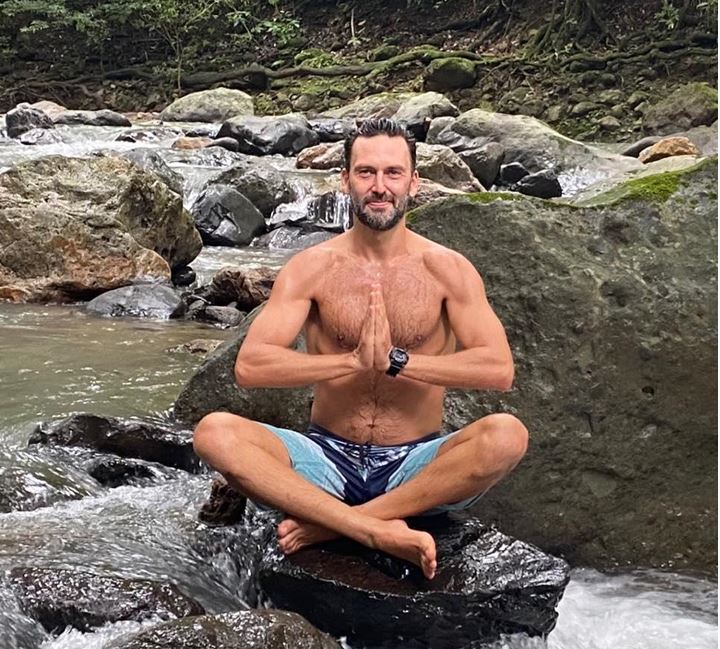
Liran Rosenfeld, Founder of Yoko Village
He credits this new mindset and healthy balance, the same one espoused by ecovillages, with his newfound success. Not only has he built Yoko Village in that very location to share this superior lifestyle with others, but he has become a regional partner for Amazon in Costa Rica and today runs an operation with 60 full time employees that are empowering the economy of nearby Santa Teresa.
According to Liran, Yoko Village is unique in that it is a community made up of “doers and makers” and the Yoko community provides them with all the tools and facilities they need to succeed such as cutting edge work centers and lightning fast fiber optic internet.
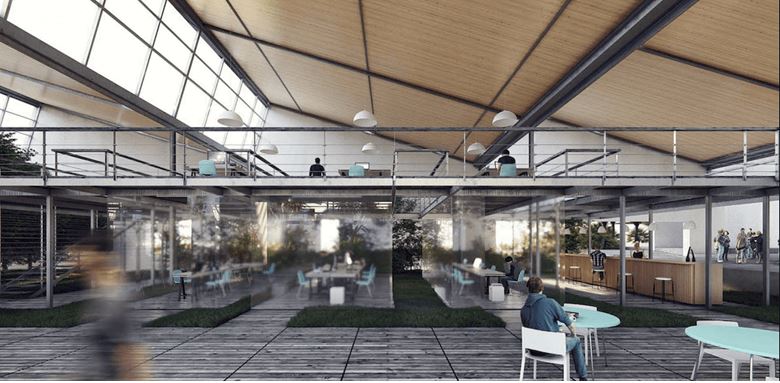
Yoko Village work center. Courtesy Yoko Village
Yoko offers the vibe of a tech hub filled with excitement and creative energy, but without the high levels of stress one usually associates with such an environment. This is due to the calming nature of the beautifully scenic surroundings and vacation-like amenities. Not to mention the luxurious touches that some of the more affluent residents have come to expect - tropical beaches, a spa, healthy gourmet food, and more.
The diversity of Yoko Village is also a draw. It has been attracting a mix of people from all over the world including Europe, Asia, the Middle East, Africa and the Americas. Liran foresees at least 30 nationalities ultimately living at Yoko by the time the community is fully established. It seems to appeal equally to both singles and families, of all ages. The community has also garnered much interest from artists, startup founders and many remote corporate workers. “But what they all have in common is their love of good food, beach and/or mountain life, and the desire to have a healthy work-life balance.” At Yoko Village they will all be able to engage with each other, both professionally and socially, working and living in style, all while surrounded by nature’s majestic beauty.
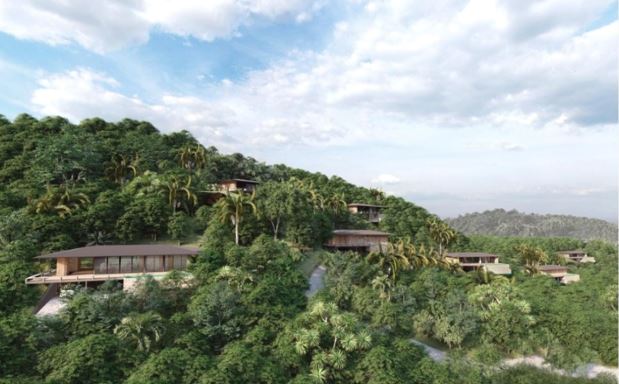
Mountain view from Yoko Village. Courtesy of Yoko Village
Offering such diversity however, also requires some additional flexibility. Yoko Village is actually made up of two distinct locations: Yoko Tech, located at the heart of Santa Teresa, and Yoko Eco. Yoko Tech is aimed at a younger audience of startup founders, artists and corporate workers. The residents there do not live full time at Yoko Village and once the danger of the pandemic finally passes, they would likely spend much of their time back in their home countries. But they could allow friends and family to stay in their place, like any other vacation home. They could even use Airbnb for the short-term subletting of their Yoko properties.
Yoko Eco is located 25 minutes outside Santa Teresa and is aimed at families that live in Yoko all year long. “Being that Yoko Village shares the same time zone as the US, and is all inclusive, providing everything one might need, this appeals to far more people than you might think.” And for those who do need a break from the isolation of Yoko Village, “nearby Santa Teresa offers plenty of bars, restaurants, beach gatherings, workshops, concerts, festivals, retreats, and lots of private events.” Santa Teresa is quite safe as well; especially for those living in gated communities like Yoko. “I love it that I can leave my car keys inside the car and never lock the house, that’s a great advantage,” says Liran. From my own research, I learned that Liran is correct - Costa Rica is actually the safest country in all of Latin and Central America.
But before you pack your bags, realize that all this can come with a steep price tag; prices start at $250,000 for a 1BR Yoko Villa and $320,000 for a 2BR Yoko Villa. Yoko Village is still under construction, though the first houses have already been completed. It will ultimately have 80 units that can house a total of 200 people. Additionally, not just anyone is accepted to Yoko Village. As Liran explains, “We follow an application process and schedule interviews to make sure we accept and match like-minded people. Even paradise won’t be much fun if you don’t get along with your neighbors. But anyone can apply to invest in the village or buy a home. People also have the option to buy land and build their own house.”
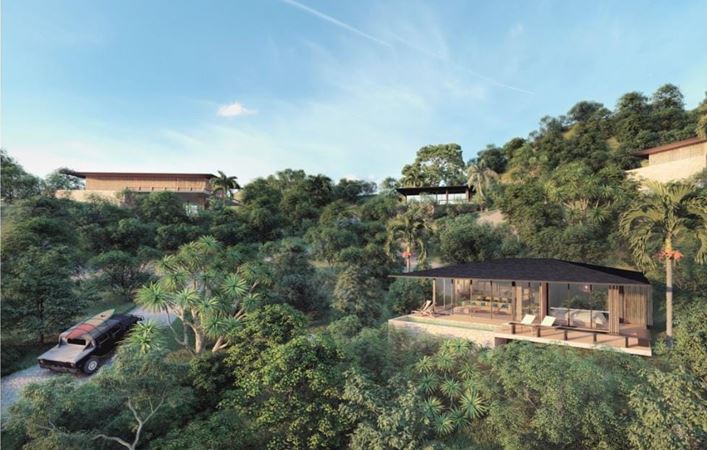
Example of the most basic 1BR villa at Yoko
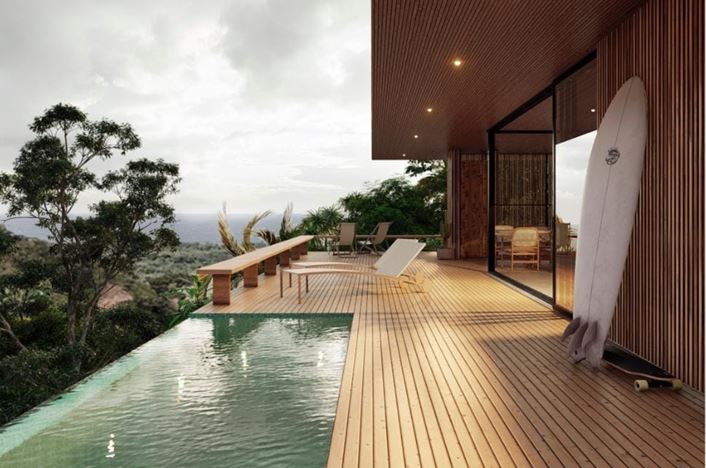
Due to privacy concerns, Liran was tight lipped about who has already purchased one of the coveted Yoko homes, but the area is already a hot spot for celebrities and industry titans. Hollywood staples such as Matt Damon and Mel Gibson, NFL star Tom Brady along with his wife, Brazilian model Gisele Bündchen, Tom Bradley and a slew of company founders such as Twitter’s Jack Dorsey and Wix’s Avishai Abrahami all purchased homes there, just to name a few. The area is attracting the attention of companies as well, such as Amazon, which recently relocated 50 employees to live there while working remotely together. And Liran noted that they are starting to see an influx of individuals from Twitter and Apple as well. But are more companies likely to follow their lead? Liran believes they will.
“The pandemic has turned life upside down. We’re all doing our best to adapt but many companies are unable to survive in this environment and we’ve seen a string of high profile companies filing for bankruptcy and shutting their doors. Many companies however, including those in the tech sector, are uniquely positioned to not only survive but thrive, as demand explodes for their products or services.”
But one challenge these companies still face is adapting to working 100% remotely. Many of the leading tech companies such as Google (GOOG, GOOGL), Twitter (TWTR), Amazon (AMZN), Apple (AAPL), Sony (SNE), American Express (AXP) and more have announced that all of their offices will remain closed until at least 2021. But without knowing when it will be safe to return, many employers have closed offices indefinitely, while others are likely to continue extending their dates to reopen.
Many companies have taken it even further. Some, like Microsoft (MSFT) and Facebook (FB), have committed to allowing up to 50% of the their work force to work remotely on a permanent basis. Square (SQ), Zillow (Z), Mastercard (MA) and others have taken it a step further and said they will allow employees to work from home permanently even after the pandemic ends. Over 100 others have joined a growing list of companies that have pledged to permanently close offices or allow most are all employees to work remotely.
Liran explains that as a result, “These companies need to find the right balance between keeping employees productive, while still ensuring their safety. But what if keeping them safe could actually make them more productive? If so, companies will come to realize there is no need to pay obscene rents for preferred office space in places like LA and NYC. Nor will they need to force employees to make the choice between having long commutes or paying high prices for small apartments close by. On the contrary, they can save money, be more effective and be more attractive to prospective employees. How? By relocating their workforce to remote, tropical locations like Yoko Village. Yoko Village is uniquely positioned to offer a safe, creative and supportive environment for these workers with everything they need to work effectively already in place.”
Liran believes that Yoko Village could be a stabilizing influence during these uncertain times. As TalkMarkets readers know, the stock market is fragile and unpredictable during chaotic times. And there’s never been a year more chaotic than 2020 in recent history. Liran suggests that “Savvy investors should consider putting their money into alternatives like Yoko Village where they are likely to see a promising return. ESG investing has become increasingly popular as well, and for such investors, Yoko village provides an opportunity to invest in a way that aligns with their values and soul.”
If Liran is right, and COVID-19 is the catalyst to fundamentally change the way we live and work, could it also be its undoing? The coronavirus has managed to find its way to nearly every distant corner of the globe; only the most remote regions remain untouched. The benefits of staying safe and far from COVID, all while living and working in a tropical paradise are obvious. But I had to inquire about what safeguards were in place to protect those relocating there. Liran’s answer was simple: in order to get inside, you must first be tested. But he wanted to point out that the entire surrounding area is far safer than most. “Fortunately for us in Santa Teresa, (at the tip of Nicoya) we barely felt the coronavirus. That’s why if you ask anyone who has been living here over the past 6 months about COVID, you get the same answer: we are one of the few lucky ones during the pandemic!”
Lastly, I had to ask Liran how readers could learn more:
“Those interested can connect with us via our web site or through email (liran@yokovillage.com). Once they express interest we send them an application where we can learn more about them. Those who pass the initial stage advance to an interview and virtual tour.”
Disclosure: This article is part of a new series of exclusive articles featuring startup companies which we believe to be of interest to readers but which receive limited coverage. Authors are ...
more



Kudos to the author, this article is done exceptionally well! Any interest in writing about my company? It's an interesting startup that I think your readers would like to hear about.
Unlike my stocks, this sounds like an investment I'd actually enjoy owning. Please contact me.
I wouldn't want to live there full time, but this sounds like an amazing way to ride out the pandemic. When will the place be move in ready?
@[Liran Rosenfeld](user:143789) is definitely onto something. I keep reading about more and more companies that have announced they will let their employees work remotely.
Thank you Wall Street Jack. The tables are turning in favor of remote work and for a good reason too. We generally tend to work 12-16 hours per week, there's no work-life balance, and we tend to spend more time working than with our loved ones, who we are actually working so hard for.
Impressed, Sign me up!
So true. This is a great idea. I think I'm reaching a mid-life crisis and need a change like this. The year of Covid has really made me reevaluate my priorities.
You are right it really has made us reevaluate our priorities, and having a healthy work-life balance is just one of them.
Same here. But what about children? What's there to do for them over there?
You will not get away from Covid by going to Costa Rica. As of 10/15/20 they had 1,372 new cases per day (94,348 total) and rising with 25 deaths per day (1,168 total). The CDC recommends travelers avoid all nonessential international travel to Costa Rica, the Covid risk is high. Don't know what the medical facilities are in Costa Rica but as an expat you might have trouble since resources are limited.
I've been to Costa Rica in 2017 and the place is great but it's not the solution to your Covid pandemic.
I agree you Thomas, the data you have here is true. But let's not forget this is way less as compared to the number of COVID-19 cases we have in the United States. Where the number of new cases has already surpassed 12,000 per day. As per today's data (10/19/2020), the number of new cases in the United States is 12,524, which is over ten times more than in Costa Rica and with over 224,000 deaths so far, the situation in the U.S is getting scarier. Yoko village provides you with an alternative solution to get away from all this. We are not saying you shouldn't maintain social distancing nor are we claiming that you will not catch the disease if you are here. However, what we are saying is that the chances of infection in Santa Teresa is less than in the United States.
I think any place is safer than the US these days.
This makes sense.
So where is safe to go?
Sounds amazing. Out of curiosity, what does Yoko Village mean? Does the name have some significance?
Yoko means Sunshine Child.
And what does "Sunshine child" mean?
The term Yoko is derived from Japanese. It means a sunny/sunshine child. In Japanese culture, this is a happy child surrounded by positive energy. Children, in general, bring hope and give us a reason to carry on. They fill our lives with positivity. Likewise 'Yoko Village' has been established with the hope for a better and more positive work environment. It allows for healthy living and work-life balance that is generally missing in our lives.
Love it!
thank you
@[Liran Rosenfeld](user:143789), would love to learn more.
Ping me liran@yokovillage.com
While I realize it is now all the rage to telecommute, I believe once the pandemic finally ends, corporate greed will end up forcing employees back into offices. For now, remote locations make perfect sense. But once the pandemic ends completely (in 1+ years from), I think only a lucky few could live in such paradise permanently. It would make for a great vacation spot time share or for a corporate getaway.
Hi Anne, I tend to agree but not all the time. Many companies discovered that working in remote works better and while some companies will make their employees come back to the office, many others have already declared that office centricity is over. Especially in Silicon Vally.
So people could buy a home there to live full-time, but also have the option to rent for short-term visits?
Yes, that is correct. You can live full time or be there part of the year and rent your place when you're not around. The ROI is pretty remarkable.
Loading comments, please wait...